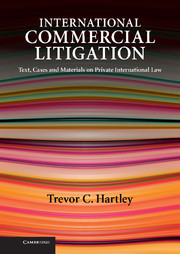Book contents
- Frontmatter
- Contents
- Table of panels
- List of figures
- Preface
- Acknowledgments
- Terminology
- Table of Latin phrases
- List of abbreviations
- Table of cases
- Table of cases (European Court of Justice, numerical order)
- Table of legislative instruments
- PART I STARTING OFF
- PART II JURISDICTION
- PART III FOREIGN JUDGMENTS
- 13 Introduction to Part III
- 14 EC law
- 15 English law: jurisdiction
- 16 English law: defences
- 17 The Canadian conflicts (judgments) revolution
- 18 US law: some highlights
- PART IV PROCEDURE
- PART V CHOICE OF LAW
- PART VI EXTRATERRITORIALITY
- Bibliography
- Index
16 - English law: defences
from PART III - FOREIGN JUDGMENTS
- Frontmatter
- Contents
- Table of panels
- List of figures
- Preface
- Acknowledgments
- Terminology
- Table of Latin phrases
- List of abbreviations
- Table of cases
- Table of cases (European Court of Justice, numerical order)
- Table of legislative instruments
- PART I STARTING OFF
- PART II JURISDICTION
- PART III FOREIGN JUDGMENTS
- 13 Introduction to Part III
- 14 EC law
- 15 English law: jurisdiction
- 16 English law: defences
- 17 The Canadian conflicts (judgments) revolution
- 18 US law: some highlights
- PART IV PROCEDURE
- PART V CHOICE OF LAW
- PART VI EXTRATERRITORIALITY
- Bibliography
- Index
Summary
Even if the foreign court had jurisdiction in English eyes, and even if the foreign judgment is final and conclusive and for a sum of money, it will still not be recognized or enforced if the judgment-debtor can establish one of a number of defences open to him. The most important are:
the judgment was obtained by fraud;
the foreign proceedings were contrary to natural justice (due process or fair procedure);
recognition of the judgment would be contrary to public policy;
recognition of the judgment would be contrary to human rights as laid down in the European Convention on Human Rights (given direct effect in the United Kingdom by the Human Rights Act 1998);
the judgment was for a tax or penalty, or was based on some other public law; or
the judgment conflicts with another judgment.
Fraud
Under English law, a foreign judgment will not be recognized if it was obtained by fraud. The onus of raising and proving fraud is on the judgment-debtor. Fraud may be committed either by the judgment-creditor or by the court. Accepting a bribe would be an example of the latter, though that would also constitute an infringement of natural justice. It is of course extremely difficult to prove.
- Type
- Chapter
- Information
- International Commercial LitigationText, Cases and Materials on Private International Law, pp. 358 - 381Publisher: Cambridge University PressPrint publication year: 2009



